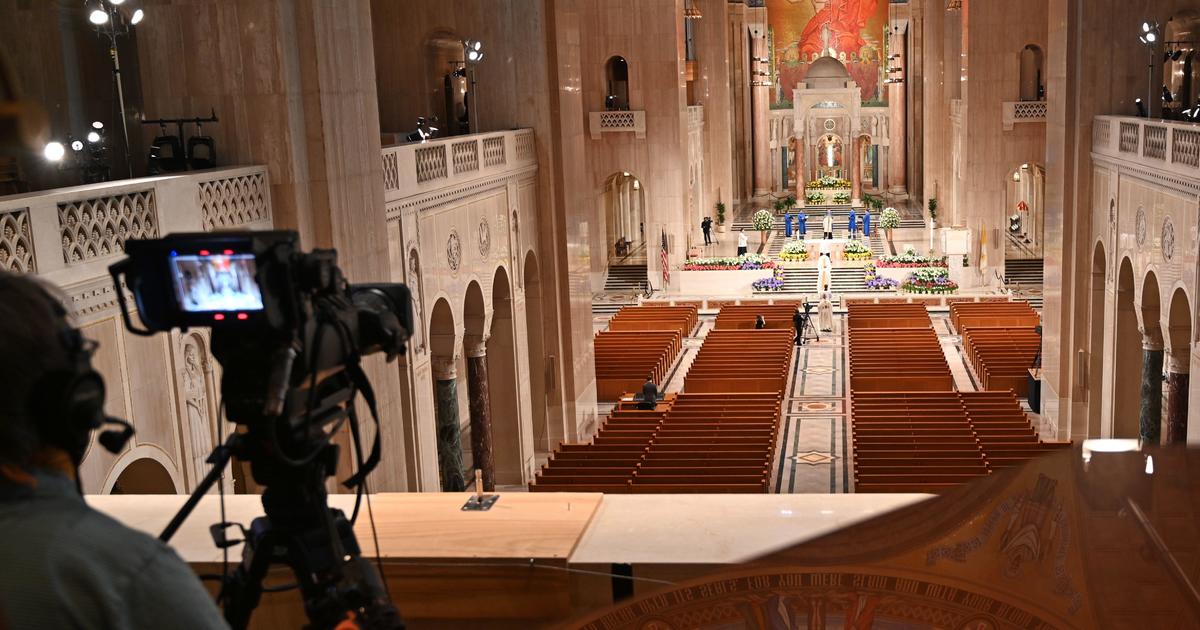More than 12,000 Catholic churches in the U.S. applied for PPP loans – and 9,000 got them - CBS News

As suffering small businesses around the country clamor for much-needed loans from the federal Paycheck Protection Program, news of prominent national chains receiving millions of dollars sparked an outcry among owners of smaller businesses who have been shut out. Now, many will likely be surprised to learn that between 12,000 and 13,000 of the 17,000 Catholic churches in the U.S. also applied for those coveted PPP loans.
Pat Markey, the executive director of the Diocesan Fiscal Management Conference, an association of finance officers from Catholic dioceses, estimates that around 6,000 Catholic parishes had their applications for federal funding approved in the first round of PPP and around 3,000 have received loans so far in the second round.
While most people likely don’t think of Catholic churches as small businesses, Markey says houses of worship and their affiliated schools are trying to keep employees on their payrolls as well.
“The PPP isn’t about the federal government assisting houses of worship or churches,” he tells CBS News. “PPP is about keeping people on payrolls and a large segment of our society is the not for profit world. And a large segment of that society are churches and houses of worship. And they have people on payrolls too. So, if what this is about is keeping people on payrolls, then we all should have availability to do that."
And Catholic churches were not the only religious institutions seeking PPP funds.
A new survey by LifeWay Research found that 40% of Protestant churches in the U.S. also applied for government assistance offered either through the CARES Act or the Small Business Administration, and 23% of those church’s pastors reported that their applications were accepted — meaning that 59% of Protestant churches that applied for assistance were approved.
The larger the church, the more likely it was to have applied for federal aid. Half of the pastors at churches that average 200 or more attendees said their church applied for a loan, compared to only a third of churches that average fewer than 50 attendees.
A representative for the The Jewish Federations of North America told CBS News that they conducted a survey on April 21 and learned that "573 Jewish organizations were approved for PPP loans, with a total value of $276 million. Among that group were 219 synagogues who received just over $50 million in loans.”
An additional 391 Jewish organizations reported that they had applied for loans and were awaiting the government’s response. Those requests had a total value of $106 million and a median value of $118,000. However, there were only 1,200 responses to the The Jewish Federations of North America’s survey, so they believe the actual numbers are higher.
According to the U.S. Small Business Administration, “Churches (including temples, mosques, synagogues, and other houses of worship), integrated auxiliaries of churches, and conventions or associations of churches qualify for PPP and EIDL loans as long as they meet the requirements of Section 501©(3) of the Internal Revenue Code, and all other PPP and EIDL requirements."
Essentially, the requirements for PPP loans are the same whether a business or organization is secular or not. Churches are automatically granted nonprofit status. So, as long as a house of worship employs 500 people or fewer, it can now request a federal loan for an amount 2.5 times its average monthly payroll. Those loans, plus their 1% interest, will be forgiven by the government as long as 75% of the funds are used to cover payroll expenses in the eight weeks after the house of worship receives the funds. The remaining 25% can be used to pay rent, utilities, insurance and other operating costs.
Given that they do qualify, U.S. houses of worship have likely been moved to apply for federal assistance because of the drop they are experiencing in donations from the faithful as people stay home. According to the survey of Protestant churches conducted by LifeWay, 40% of pastors report that giving has decreased compared to earlier this year. More than half of pastors say giving has decreased more than 25%, and 18% of pastors report that it is currently down 50% or more.
However, there are some in the Christian community who don’t believe it’s right for churches to take advantage of PPP loans.
"It’s quite possible that if most churches take advantage of PPP loans, it could easily capture one third of the entire $350 billion allocation,” Jon Costas, a former Republican mayor of Valparaiso, Indiana, wrote in Christianity Today last month. “There are socio-economic and social justice issues here that must be considered by suburban churches who may drain grant money away from those who need it more. I believe the decision to apply for and receive PPP funds is one of the most important issues the church will face in this decade. It will set a precedent for the future and may, in time, hinder the mission of the church when the strings attached to government funds are not consistent with Scripture."
Markey, however, disagrees, pointing to the fact that PPP funds have been offered to U.S. houses of worship "without strings attached.”
“Our message to our membership was: If you need this funding to keep your people employed, you don’t have any other resources, then absolutely you should apply,” he says. “If instead you don’t need it, if there are other ways that you can meet those demands… then don’t apply because there are other small businesses out there that need those funds. And since we see that not all parishes applied, we think our membership followed that advice. ”
This content was originally published here.
from Tumblr https://ift.tt/3qyMyoT
via IFTTT
Mga Komento
Mag-post ng isang Komento